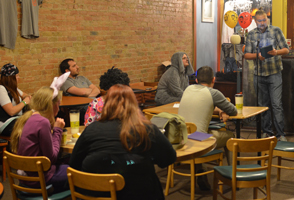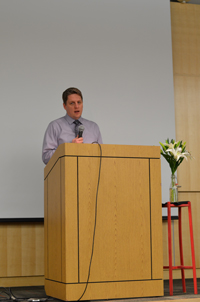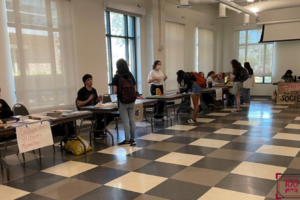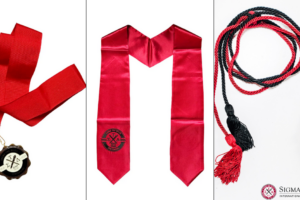 Matthew Drollette
Matthew Drollette
Far Western Student Representative
Alpha Upsilon Gamma Chapter
Weber State University, Ogden, UT
Starting a new chapter of Sigma Tau Delta isn’t easy. We are all busy people. We have exams, quizzes, papers, assignments, studying, and (hopefully) social lives. With our general lack of free time, it can be hard to find the time of day to attend weekly meetings, service projects, fundraisers, and other Society events. So why do we do it? What makes us want to achieve a higher amount of success as members of an honor society?
We all may answer these questions differently, but for most of us, our drive to succeed professionally and academically tends to take precedence over other, more inconsequential tasks. We also have found that Sigma Tau Delta has become a venue for us to express our interests in ways that matter. These are all laudable qualities that make the students involved in Sigma Tau Delta some of the best students in the world. But what happens when the pressures of life get in the way of our goals for higher success and meaningful community engagement?

My home chapter, Alpha Upsilon Gamma of Weber State University in Ogden, Utah, sees its fair share of time-constraint difficulties. And, since we are also all at the top of our class, academic pressures become daunting as we try to juggle school, work, friends, and chapter events. While these things are true for the members of most chapters, our chapter here in Ogden has the added struggle of being housed at a predominately non-traditional university. By non-traditional I mean that a large number of our students fit into one of the subcategories required for nontraditional studentship: marriage (divorced or widowed), parenthood, or non-traditional age (typically over 25). So, along with our academic pressures, we find that students in Weber’s chapter tend to split their time between the usual academic pressures along with things like children’s soccer practice, daycare drop offs, family gatherings, court dates, and careers. In short, it’s not easy being a “non-trad” student and a member of Sigma Tau Delta. The reason I bring this up, though, is because this situation is not unique to Weber State. In fact, many chapters must deal with the conflicts that arise from having high numbers of non-trad membership. Yet I know that a chapter like ours can still be successful, despite the conflicts that arise. And if we can do it, others can too.

Our founding president, Reggie Carlisle, understood the issues that would arise when our older students tried to spread thin the hours in the day, so he adopted a policy of overkill that has extended into every aspect of our chapter. Instead of one meeting a week at recurring times, Reggie implemented optional meetings at varying times throughout the week, sometimes holding two or three meetings a week to accommodate the many scheduling conflicts that inevitably would get in the way of students’ abilities to make it to all of the meetings. Along with flexible meeting times, we found that extending the hours of our activities often allowed time for those who couldn’t show up at the beginning to help at the end. We even went as far as hosting (child-free) “after-party” events for those who work late into the night. While these accommodations have often been taxing for student leaders, who try to make it to every meeting, this policy has made it easier for members to connect with each other, despite the difficulties of fitting chapter activities into their busy schedules. As an added benefit, potential members who are hesitant to join because of their time constraints are relieved to find that we offer such flexible hours, which often gives them that extra push to join and helps to make our growing chapter even better.

Kyle Poppitz, Vice President
While keeping our schedules flexible and open has helped greatly, another key aspect of making a non-traditional chapter a success is communication. Communication among chapter leadership has never been an issue, but disseminating information to each member can be quite the hardship. This is where Facebook comes in. I can’t begin to tell how beneficial social media has been in helping our members communicate. But again, the key to this resource is flexibility. A Facebook page that only posts about chapter events is missing out on the potential that social media gives us to connect with one another as professionals, scholars, and friends. So we’ve used our chapter’s page to advertise other events from across campus that fit our members’ interests. We also invite our members to post questions and job listings, and to provide them with opportunities to submit their writing. When Facebook becomes a venue for members to socialize, it then becomes a tool that they interact with often, providing chapter leadership with a reliable way to contact members and get them the important Society news to which they might not otherwise have easy access. In short, giving members a safe place (online) to be friends goes a long way in terms of developing strong lines of communication.
Now, I know I’ve gone on a lot about scheduling and communication, but these things have worked for us. We still have issues, especially along the lines of planning chapter events, but these issues are becoming easier to combat as we learn more effective ways to interact with each other in meaningful and accessible ways. What’s more important, though, is that we are open to suggestions, as are other chapters who face similar issues. So, if members have suggestions for making non-traditional chapters even more successful, send those up through your leadership, post them on your regional Facebook pages, or write a blog post about them. Let’s make it possible for students of all walks of life to be successful and to get the most out of their memberships in Sigma Tau Delta.
Related Links:
- Chapter Noteworthy Activities database contains descriptions of the most noteworthy activities various Society chapters engaged in. Members can sort the list by activity type, year, and/or school in order to find out what other chapters are up to and to get ideas for their own chapter activities.





Add Comment